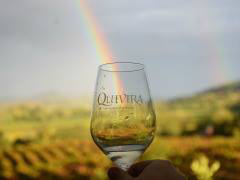Biodynamic and Organic Farming
Quivira Vineyards and Winery, located in Sonoma County, believes they can make a positive impression on the land by using only organic and biodynamic farming practices. Biodynamic farming, simply put, is a “closed loop” agricultural philosophy created to maintain crop health without added chemicals or external additions. The core of biodynamics is creating the healthiest soil and environment possible for Quivira’s vineyards, compost, chicken coops and vegetable garden.
In addition, Quivira is committed to conserving energy and installed a 55 kW solar electric system, which supplies 100 percent of their energy use. The winery’s guest houses and estates also feature solar panels, supplying the structures with 75 percent of their energy use. Quivira also has drastically reduced water use at the winery and estate. A steam cleaning machine allows for winery equipment to be cleaned while using 98 percent less water than traditional methods. The steam cleaning method not only reduces water waste, but also the need for chemical detergents. To protect natural water sources, Quivira built low-fall dams and planted natural grasses to contain water runoff from the vineyard. Farm lanes were also moved 12-15 feet away from a natural creek to reduce chemical and agricultural pollution in the water stream.
Quivira is also a financial supporter of Trout Unlimited, a non-profit dedicated to protecting cold water fish and watersheds. The donations enable Trout Unlimited to protect cold water fish, like trout and salmon, restore and conserve natural water ways and host public awareness campaigns.
Quivira Vineyards and Winery is dedicated to protecting environment and conserving the land for future generations to enjoy. Through their biodynamic vineyard, sustainable winery and post-production donations to a conservation group, Quivira is leading the way as a sustainable business and demonstrating to others that profitability and green business actions are never exclusive.


Quivira composts organic material from the vineyards in a 500-cubic yard compost pile. The compost is used to fertilize the vineyard, returning nutrients to the soil.
